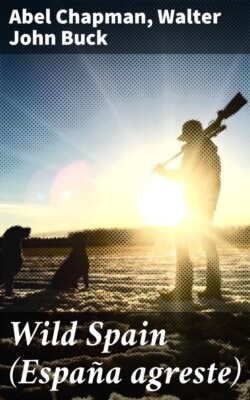Читать книгу Wild Spain (España agreste) - Abel Chapman - Страница 7
На сайте Литреса книга снята с продажи.
A Night at a Posada.
ОглавлениеTable of Contents
The wayfarer has been travelling all day across the scrub-clad wastes, fragrant with rosemary and wild thyme, without perhaps seeing a human being beyond a stray shepherd or a band of nomad gypsies encamped amidst the green palmettos. Towards night he reaches some small village where he seeks the rude posada. He sees his horse provided with a good feed of barley and as much broken straw as he can eat. He is himself regaled with one dish—probably the olla, or a guiso (stew) of kid, either of them, as a rule, of a rich red-brick hue from the colour of the red pepper, or capsicum in the chorizo or sausage, which is an important (and potent) component of most Spanish dishes. The steaming olla will presently be set on a low table before the large wood-fire, and, with the best of crisp white bread and wine, the traveller enjoys his meal in company with any other guest that may have arrived at the time—be he muleteer or hidalgo. What a fund of information may be picked up during that promiscuous supper—there will be the housewife, the barber and the Padre of the village, perhaps a goatherd come down from the mountains, a muleteer, and a charcoal-burner or two, each ready to tell his own tale, or enter into friendly discussion with the Inglés. Then, as you light your breva, a note or two struck on the guitar fall on ears predisposed to be pleased.
How well one knows those first few opening notes! No occasion to ask that it may go on: it will all come in time, and one knows there is a merry evening in prospect. One by one the villagers drop in, and an ever-widening circle is formed around the open hearth; rows of children collect, even the dogs draw around to look on. The player and the company gradually warm up till couplet after couplet of pathetic "malagueñas" follow in quick succession. These songs are generally topical, and almost always extempore: and as most Spaniards can—or rather are anxious to—one enjoys many verses that are very prettily as well as wittily conceived.
DANCERS WITH CASTANETS.
But the girls must dance, and find no difficulty in getting partners to join them. The malagueñas cease, and one or perhaps two couples stand up, and a pretty sight they afford! Seldom does one see girl-faces so full of fun and so supremely happy, as they adjust the castanets, and one damsel steps aside to whisper something sly to a sister or friend. And now the dance commences: observe there is no slurring or attempt to save themselves in any movement. Each step and figure is carefully executed, but with easy spontaneous grace and precision, both by the girl and her partner.
Though two or more pairs may be dancing at once, each is quite independent of the others, and only dance to themselves: nor do the partners ever touch each other.[6] The steps are difficult and somewhat intricate, and there is plenty of scope for individual skill, though grace of movement and supple pliancy of limb and body are almost universal and are strong points in dancing both the fandango and minuet. Presently the climax of the dance approaches. The notes of the guitar grow faster and faster: the man—a stalwart shepherd lad—leaps and bounds around his pirouetting partner, and the steps, though still well ordered and in time, grow so fast one can hardly follow their movements.
THE VILLAGE POSADA.
Now others rise and take the places of the first dancers, and so the evening passes: perhaps a few glasses of aguardiente are handed round—certainly much tobacco is smoked—the older folks keep time to the music with hand-clapping, and all is good nature and merriment.
What is it that makes the recollection of such evenings so pleasant? Is it merely the fascinating simplicity of the music and freedom of the dance; is it the spectacle of those weird, picturesque groups, bronze-visaged men and dark-eyed maidens, all lit up by the blaze of the great wood-fire on the hearth and low-burning oil-lamp suspended from the rafters? Perhaps it is only the remembrance of many happy evenings spent among these same people since our boyhood. This we can truly say, that when at last you turn in to sleep you feel happy and secure among a peasantry with whom politeness and sympathy are the only passports required to secure to you both friendship and protection if required. Nor is there a pleasanter means of forming some acquaintance with Spanish country life and customs than a few evenings spent thus at farm-house or village-inn in any retired district of laughter-loving Andalucia.
